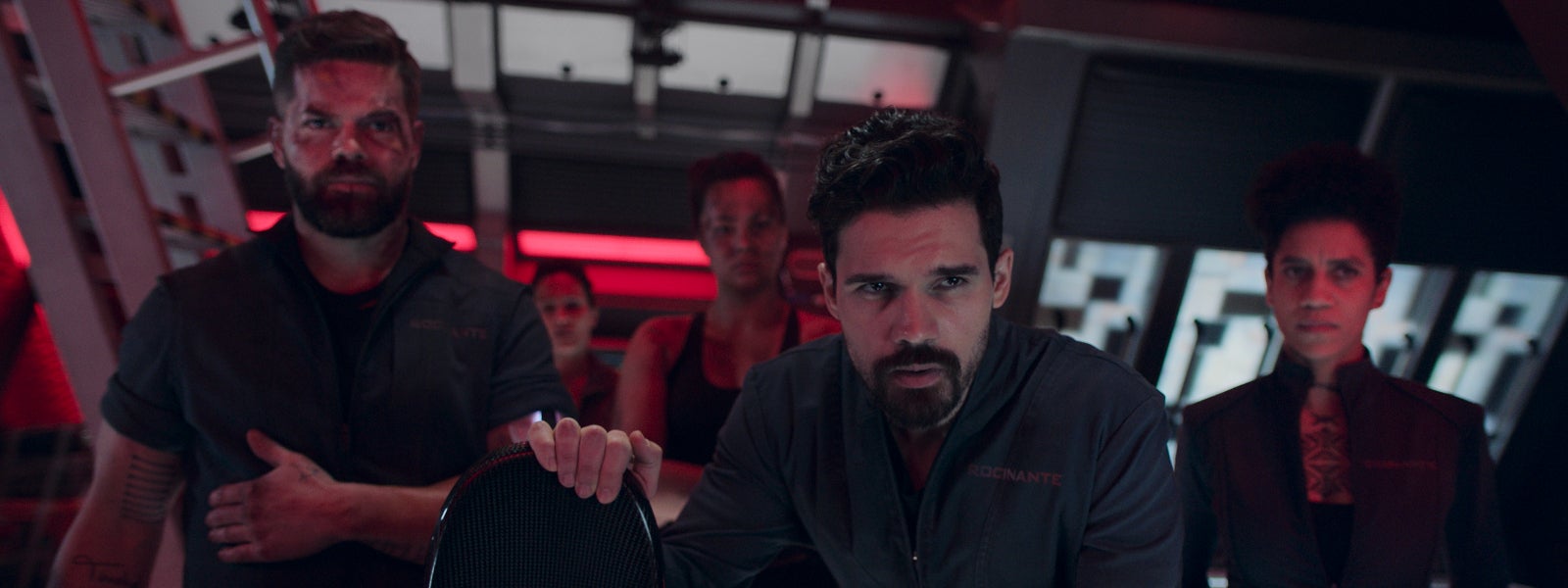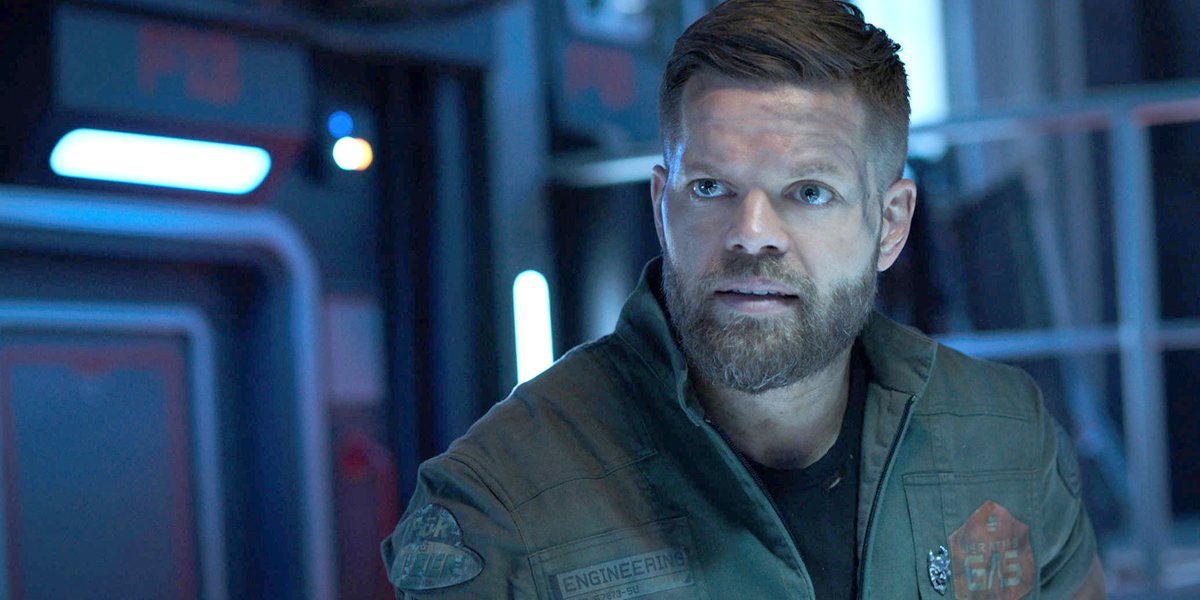If you are a science fiction fan then you’ve almost certainly watched The Expanse already. But if not, boy do I have a Christmas present for you. I have watched most of the iconic science fiction series and I can say this is as good as any of them, and better than most. Having said that, the first time I watched the series my wife and I finished season one and I was on the fence about continuing. But we decided to give season two a chance, and I’m so glad we did.
Funny enough, I’ve discussed this with three other friends who gave up on The Expanse after the first season. I told them all to go back and start again and they were all thankful for my suggestion. It isn’t that season one is bad. It’s just not exceptional. It takes a little while to get it’s feet. And there’s the protomolecule that feels like it belongs in the realm of the supernatural instead of science fiction. But it works out in time.
Join the PERA (Personal Entertainment Research Assistant) waitlist.
The World's Most Indispensable Movie App
The RunPee app tells you the best times to
run & pee during a movie
so you don't miss the best scenes.
Download the RunPee app.
100% free (donation supported)
Shifting Conflicts
One of the more enjoyable aspects of The Expanse is the shifting conflicts between factions and the position of the main characters who are caught between the clash of larger forces. The writers do a great job of staying true to the characters and power struggles. It’s mature in the sense that they don’t create drama for the sake of drama. There are many times it feels like watching a documentary reenactment of events in the near future.
Political Relevance
One of The Expanse’s greatest strengths is how it mirrors contemporary political issues through its sci-fi lens. The tensions between Earth, Mars, and the Belt reflect real-world conflicts between established powers and emerging populations fighting for recognition and resources. The show manages to tackle complex themes like colonialism, class warfare, and resource distribution without feeling preachy or losing its entertainment value.
What people are saying
about the RunPee app.
Single best investment
By and far best investment Ive made. I used to drive my husband nuts because Id be a fidgeting mess the last half hour of the movie trying not to miss important parts. Now I just turn this app on and *bam* I can actually focus on the movie the whole time. Even puts alerts to my watch so even better. Also I can guarentee all the 5
reviews arent fake as one person accused - its just that so many of us movie-goers had the same problem and this fixed it. Yes, it is paid but jeeze its expensive to keep watching movies and updating an app for every movie. And if you read more about the creator he mentions he has several people contributing - so yeah its paid but omg worth every cent. 10/10
Developers note: the RunPee app is now, and always will be, 100% free. Donations are optional.
View all reviews
Apple App Store | Google Play Store
Download RunPee app
Great Characters
Every character is written with great care. It is evident that the writers created detailed backstories for everyone. When the series starts it throws together a group of strangers who have to work together for their survival in the mist of conflict that spans the power structures of solar system politics. The characters have to get to know each other, which gives the audience the chance to get to know them as well. But it doesn’t come in huge character exposition dumps. We discover more and more about each character over time, just like real people.
What makes the character development particularly compelling is how the show allows relationships to evolve naturally over time. Unlike many sci-fi shows that rely on sudden character shifts to drive drama, The Expanse demonstrates how people change gradually through their experiences and choices. This is especially evident in characters like Amos, whose complexity unfolds layer by layer across seasons, revealing a deeply nuanced person beneath his seemingly straightforward exterior.
Diverse But Not Confusing Characters
One of my biggest gripes about a show is when there are too many characters that are similar and hard to distinguish from others. It really ruins the flow of a show when you can’t remember a character and their role in the plot. Despite having a rather large set of characters, they are all easy to distinguish and remember. The character basically break down into the following groups:
- The crew of the Rocinante. You can think of them as the Guardians of the Solar System. The crew makeup is entirely unoriginal: captain, engineer, security/muscle, pilot. Just like Farscape, or the copycat Guardians of the Galaxy, or take your pick of Star Trek series.
- Captain: Holden
- Engineer: Naomi
- Security: Amos
- Pilot: Alex
- Earth Federation
- Avasarala (United Nations Assistant Undersecretary of Executive Administration)
- Errinwrite (United Nations Undersecretary of Executive Administration)
- Gillis (United Nations Secretary General)
- various other minor characters
- Belters (basically the blue-collar workers of the solar system who mainly inhabit asteroids and minor planets/moons)
- Drummer (captain/engineer/leader)
- Fred Johnson (leader)
- Anderson Dawes (leader)
- Klaes Ashford (veteran captain)
- various other minor characters
- Martians
- Roberta “Bobbie” Draper (Soldier)
- various other minor characters
- Others
- Joe Miller (Detective)
Other characters are featured in a few episodes or maybe a season, but this is the core group.
My Favorite Science Fiction Character Ever
I have to say that Amos is the best-written character and my favorite overall character from any science fiction series. That includes Picard, Starbuck, Kirk, Spock, etc. Amos seems like a sidekick, but he’s so much more. And he has, hands down, one of the best lines and scenes in all of science fiction. If you’ve watched The Expanse then you know the scene, “I’m that guy.” I’m including it below for fans to relive. But trust me, if you haven’t watched the series then I recommend skipping the video. It will spoil a great moment that comes in season 3 episode 6 “Immolation”.
Language
One of the most impressive aspects of The Expanse’s world-building is the development of “Lang Belta” (Belter Creole), a fully realized creole language that emerged from the mixing of Earth’s languages in the Belt. Unlike many sci-fi shows that simply sprinkle in made-up words, The Expanse’s Belter language feels organic and lived-in, reflecting the cultural heritage and daily experiences of the Belt’s inhabitants.
Common Belter phrases you’ll hear throughout the show include:
- “Beratna/Sésata” – Brother/Sister
- “Beltalowda” – Belter people (literally “Belt people”)
- “Inyalowda” – Inners (derogatory term for people from Earth and Mars)
- “Kopeng” – Friend
- “Sasa ke?” – Understand? (literally “Know what?”)
- “Bossmang” – Boss (person in charge)
- “Keya” – Okay
- “Mi pensa” – I think
- “Oye” – Hey/Listen
- “Tumang” – Earthers (derogatory)
What makes Lang Belta particularly believable is how it evolved naturally from a mix of Earth languages including English, Chinese, Russian, French, and others – reflecting the diverse cultural backgrounds of the original Belt colonists. The language also incorporates hand gestures, which makes sense for a culture that often communicates while wearing space suits.
The authenticity of Lang Belta comes from its development by linguist Nick Farmer, who created not just a vocabulary but a complete grammatical system that reflects the history and culture of the Belt. This attention to linguistic detail adds another layer of realism to the show’s already impressive world-building.
Space Physics
One thing that stands out in The Expanse is the adherence to space physics. That is, getting around in space takes time, and fuel. Changing course quickly is painful. This is all factored into every event where one ship has to get someplace fast. Many astrophysicists have made videos lauding the accuracy of space travel in The Expanse. When ships go into battle it feels real. Bullets travel through the ships. This becomes part of the plot every time it comes up. They don’t take shortcuts, but factor in the realism to make it more enjoyable.
The show’s commitment to scientific accuracy extends beyond just space physics. From the distinct “Belter” physiology shaped by growing up in low gravity to the realistic depiction of how space impacts human behavior and society, The Expanse creates one of the most believable future worlds ever portrayed on television. Even small details like the way characters pour and drink liquids in varying gravity conditions, demonstrate the show’s remarkable attention to scientific detail.
Seasons and Episodes
There are six seasons of The Expanse
- Season 1: 10 episodes (Rating average: 8.0)
- Season 2: 13 episodes (Rating average: 8.4)
- Season 3: 13 episodes (Rating average: 8.7)
- Season 4: 10 episodes (Rating average: 8.4)
- Season 5: 10 episodes (Rating average: 8.3)
- Season 6: 6 episodes (Rating average: 8.2)
- Total: 62 episodes
For the first 3 seasons, each episode is about 45 minutes long. Starting in season 4 the episodes get a little longer, pushing up to around 50 minutes, culminating in an hour-long final episode in season 6.
Season/Episode Ratings from IMDb
From the data above you can see that the ratings peak in season 3. Below is a chart of the ratings for each episode of each season. Click on the seasons in the legend to toggle their display.
Creator and developer of the RunPee app. When something doesn’t work right in the app it’s pretty much his fault. 🙂
Aspiring author. Would like to finish his “Zombie Revelations” trilogy if he could break away for working on RunPee and the cottage he’s building for RunPee Mom.







I was hooked from the start. I liked the slow-methodical build.
Like I said, I wasn’t enthralled with the first season when we watched it the first time. But later, after season 5 was about to release, we started over from the beginning and rewatched the series. This time, knowing what I knew, I loved the first season right from the start. I’m not really sure why it didn’t grab me the first time until midway through season 2.
Thanks for the very detailed tribute to The Expanse. I can look it up, but did I miss your pointing us to what streaming platform the series can be enjoyed on? Sorry if I did.
I should mention that. It’s all on Amazon Prime.
“The Expanse?” Indeed.
I THOUGHT I knew you (and your Merry Band).
Now I do for certain!
Bravissimo!
At the age of 80, I have seen A LOT of Science Fiction in my life, starting with the original “The Day The Earth Stood Still.” In ‘58, I picked up a Heinlein novel, and never looked back. Film often didn’t live up to my expectations.
“The Expanse” surpassed them..
I’m sure we would have a great time sitting down and talking. I’ve read most of Heinlein, but AC Clarke is my favorite. I believe I’ve read all of his science fiction, and much of his non-fiction.
Here’s a question for you: if you could invite any of the classic authors to a dinner to converse with, who would it be? As much as I love Clarke, I think Asimov might be my choice.
By the way, did you hear about the “Clarke/Asimov Treaty?”
Comments are closed.